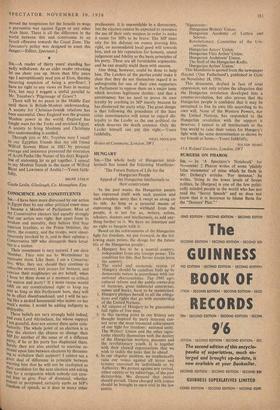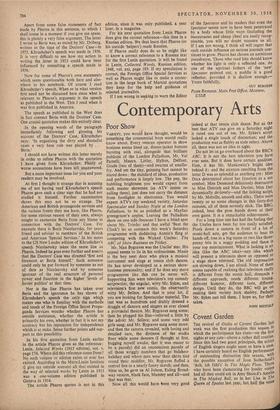BURGESS ON PHAROS
— In 'A Spectator's Notebook' for November 2 Pharos writes of some 'plainly false statements' of mine which he finds in Mr. Driberg's articles. 'For instance,' he writes, 'living in the lower levels of Soviet politics, he [Burgess] is one of the few politi- cally minded people in the world who has not read the "Secret Speech" and so does not know that it is incorrect to blame Beria for the "Doctors' Plot." '
Apart from some false statements of fact made by Pharos in this sentence, to which I shall come in a moment if you give me space, this is plainly a very false argument. The letter I wrote to Beria was, as stated by Mr. Driberg, written at the time of the Doctors' Case—in 1953. Khrushchev's speech was made in 1956. It is very difficult to see how my action in writing the letter in 1953 could have been influenced by consulting a speech made in 1956.
Now for some of Pharos's own statements which seem questionable both here and else- where in his notebook. Of course I read Khrushchev's speech. When or in what version first need not be discussed here since what is relevant to Pharos's argument is the speech as published in the West. This I read when it was first published in America.
The speech as published in the West does in fact connect Beria with the Doctors' Case. One crucial quotation makes this entirely clear.
In the opening words of the paragraph immediately following and glossing his account of the Doctors' Case, Khrushchev says : 'In organising the dirty and shameful cases a very base role was played by . . Beria.'
I should not have written this letter merely in order to refute Pharos with the quotation I have given from Khrushchev. Plenty of worse accusations have been left unanswered.
But a more important issue for you and your readers may be involved.
At first I thought it strange that in accusing me of not having read Khrushchev's speech Pharos gave such a clear sign that he had not studied it himself. Further examination shows this may not be so strange. The American and British propaganda services and the various fronts they use have, like Pharos, for some curious reason of their own, always sought to exonerate Beria from any blame in connection with the Doctors' Case. For example there is Boris Nicolaevsky, for years friend and adviser to members of the British and American 'Special Services.' In his notes to the US New Leader edition of Khrushchev's speech Nicolaevsky takes the same line as Pharos. Indeed he goes even further and asserts that the Doctors' Case was directed 'first and foremost at Beria himself.' Such nonsense could only be put forward by someone as out of date as Nicolaevsky and by someone ignorant of the real structure of personal power and function in the higher 'levels of Soviet politics' at that time.
Nor is the line Pharos has taken over Beria and the ignorance he has shown of Khrushchev's speech the only sign which makes one who is familiar with the methods and touch of the Foreign Office Secret Propa- ganda Services wonder whether Pharos has outside assistance, whether the article is primarily his own, whether in fact it is not my accuracy but his reputation for independence which is at stake. Some further points add sup- port to this possibility.
In his first quotation from Lenin earlier in the article Pharos gives as the reference : Lenin, Selected Works (1915 edition), vol. v, page 174. Where did this reference come from? No such volume or edition exists or ever has existed. According to the Marx-Lenin Institute (I give my outside sources) all that existed in the way of selected works by Lenin in 1915 was a one-volume edition published in Geneva in 1914.
The article Pharos quotes is not in this edition, since it was only published, a year later, in a magazine.
For his next quotation from Lenin Pharos does give the correct reference—this time in a Russian edition. We thus learn that Pharos (or his outside 'helpers') reads Russian.
If Pharos really does do so he might like to know a correct reference to a Russian text for the first Lenin quotation. It will be found in Lenin, Collected Words, Russian edition, 1948, vol. xxi, page 189. If my speculation is correct, the Foreign Office Special Services as well as Pharos might like to make a correc- tion in the large book of Marxist quotations they keep for the help and guidance of selected journalists.
If I am wrong in seeking to warn the Editor
of the Spectator and its readers that even the Spectator seems now to have been penetrated by a body whose little ways (including the inaccuracies and cheap jibes) are easily recog- nisable, you will no doubt reassure us all. If I am not wrong, I think all will regret that such outside influence on serious journals con- tinues to grow. Pharos has chosen an ambitious pseudonym. Those who read him should know whether his light is only a reflected one. As one of the spiritual fathers of the 'new' Spectator pointed out, a puddle is a good reflector, provided it is shallow enough.— Yours faithfully,
GUY BURGESS
PosteRestante, Main Post Office, Moscow, USSR



















































 Previous page
Previous page